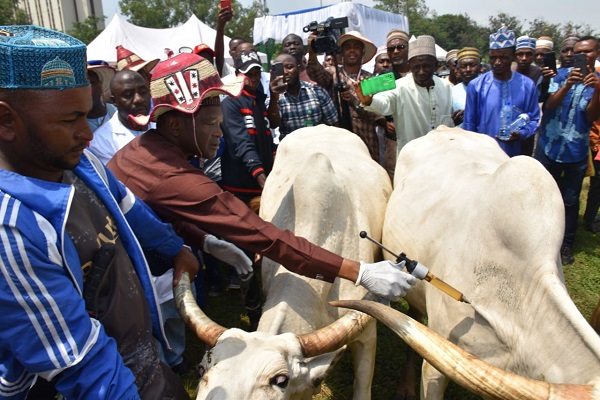
The Federal Government and stakeholders in the livestock subsector have developed a five-year National Control Strategic Plan (NCSP) to curtail the spread of transboundary diseases in the livestock sub-sector in Nigeria.
Speaking during the flag-off ceremony of the 2022 nationwide mass vaccination campaign against transboundary animal diseases for the north-central zones in Abuja, the Minister of Agriculture and Rural Development, Dr. Mohammad Abubakar said the plan would ensure improved animal production and productivity for sustainable livestock development in the country.
Abubakar revealed that the ministry revalidated the emergency preparedness plan for the control of highly pathogenic avian influenza and reviewed the Animal Disease Control Act, 2022, signed by President Muhammadu Buhari.
He further stated that the ministry, in its efforts to curtail the spread of transboundary animal diseases, procured 4,148,000 doses of CBPP vaccines, 15,479,500 doses of PPR vaccines, 2,000,000 doses of FMD vaccines and 3,000,000 doses of Newcastle Disease vaccines to be allocated to the 36 states of the Federation and FCT based on request.
The minister pointed out that, over the years and to ensure effective coverage of the vaccination, the ministry supported all the states (including the FCT) with veterinary medicare inputs, including vaccines and other consumables, as well as veterinary infrastructure such as primary health centres among others.
He, therefore, appealed to states to key into the exercise, take full ownership and sustain it to protect and preserve the critical livestock resources of the north-central geopolitical zone and the country at large.
“With the country’s livestock population estimated at 22,378,374 cattle; 53,061,143 sheep; 99,879,799 goats; 9,299,563 pigs and over 425,790,456 poultry, livestock production remains a key means of livelihood in the country. Indeed, the sector provides gainful employment for about 70 per cent of the population, especially rural dwellers.
“The sector also provides several benefits, such as the supply of animal protein, source of income and cash reserves for use in emergency and the fulfilment of cultural and religious obligations. In addition, the by-products from livestock, including hides and skin, are used in the production of materials such as belts, shoes, and bags while animal wastes serve as manure for crop production,” he said.
In her remarks, the Minister of State, Federal Capital Territory Administration, Dr. Ramatu Aliyu represented by the permanent secretary, Olusade Adesola stated that with the right structure in place, the livestock sub-sector could become Nigeria’s second leading revenue-earner.
She expressed optimism that, with such presidential interventions as the nationwide vaccination exercise, the menace of animal diseases would be curtailed to enhance sustainable development, as well as guarantee food security in the country.
In her welcome address, the chief veterinary officer of Nigeria and the director, veterinary and pest control services, Dr. Maimuna Habib stated the ministry’s commitment towards capacity-building at the Federal and State levels through training and re-training for diseases emergencies and protecting loss of livelihood.
She pointed out the ministry’s continuous support and collaboration with states to ensure the good health of livestock in Nigeria through the provision of vaccines, training, disinfectants, and veterinary drugs among others.
A statement by the ministry’s director of information signed by Mabel Obe said the highlight of the event was the symbolic flag-off vaccination exercise by the minister and the representative of the Minister of State for FCTA Olusade Adesola, among others
In attendance were members of the Sheep and Goat Farmers Association of Nigeria, members of pastoral associations, Myetti Allah Cattle Breeders, traditional rulers, among others.
The major transboundary animal diseases are contagious bovine pleuropneumonia (CBPP), foot and mouth diseases (FMD), peste des petits ruminants (PPR), African swine fever (ASF) and animal trypanosomiasis and tick-borne diseases.


